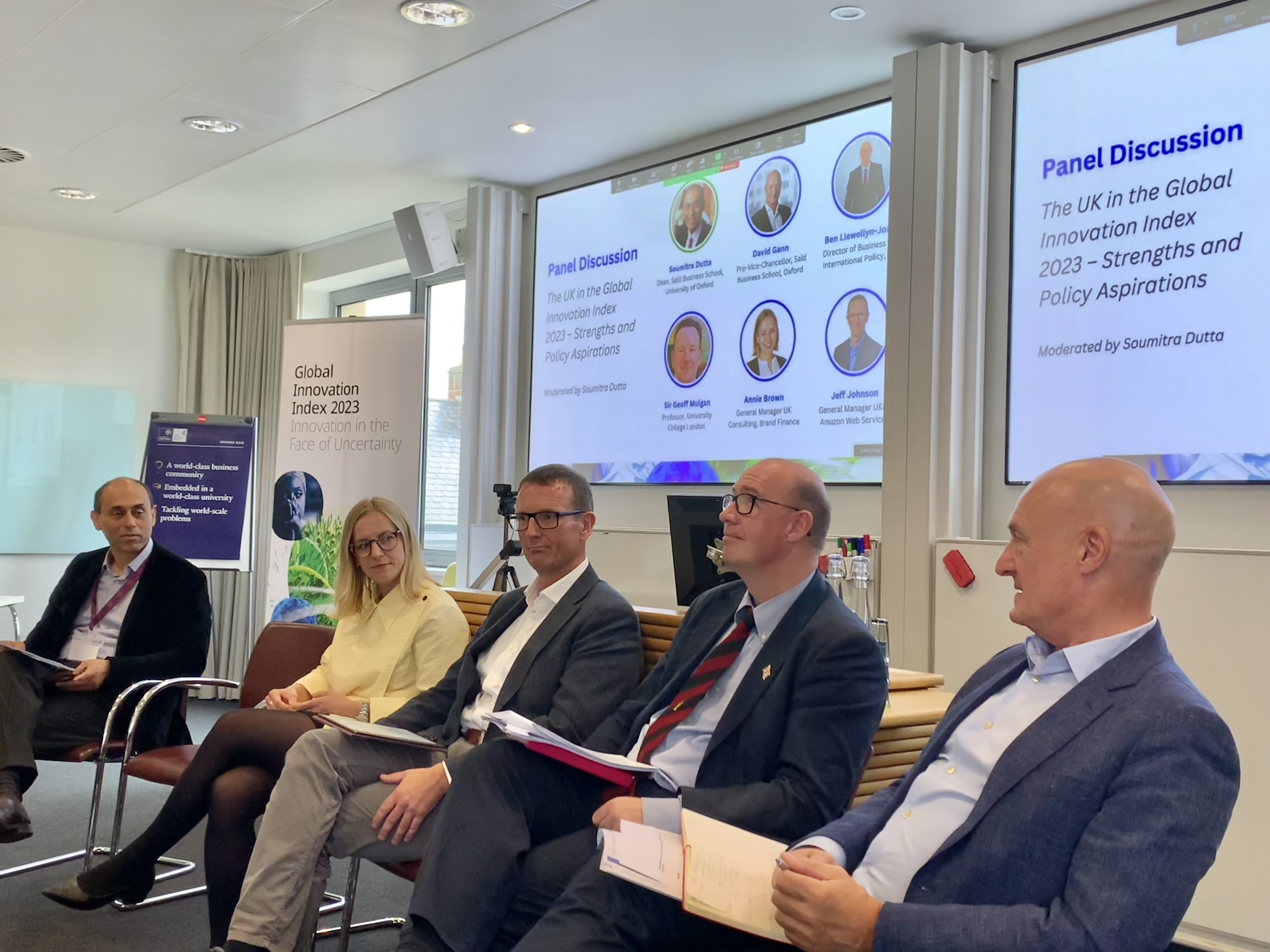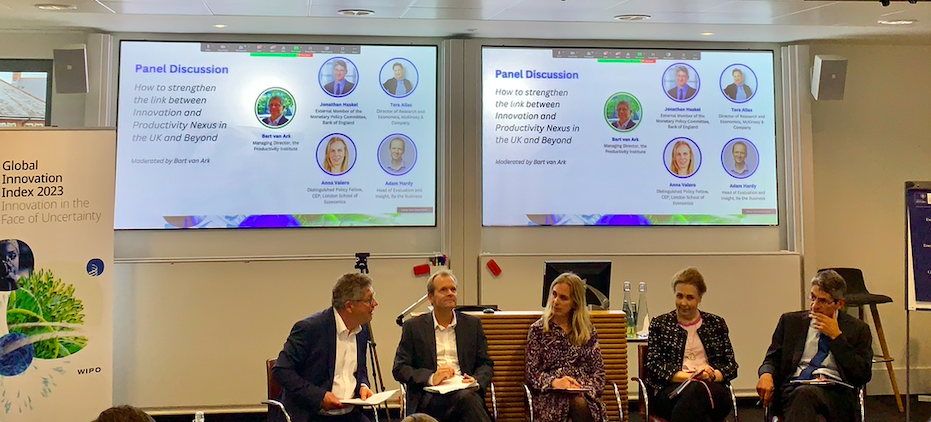The UK launch of the Global Innovation Index, held on October 2nd at the University of Oxford’s Saïd Business School and co-organized by the Portulans Institute, Saïd Business School, World Intellectual Property Organization, and The Productivity Institute at the University of Manchester, brought together a diverse group of experts from academia, government, and industry to engage in thought-provoking discussions and exchange valuable insights into the latest trends, challenges, and opportunities in the fields of innovation and productivity.
Download the UK country briefing.
The United Kingdom ranks fourth overall in the Global Innovation Index rankings for the fourth consecutive year. It recorded its best performance in creative outputs, such as intangible assets and trademarks by origin where it placed second, and market sophistication, such as credit and finance for startups and scaleups where it placed third.
“We are putting great effort towards ensuring that the GII provides good, credible metrics at the global level that are usable, and prompt nations around the world to engage in positive conversation about innovation.” – Marco Aleman, Assistant Director General, WIPO
The findings show that the UK performs better in innovation outputs than innovation inputs in 2023, showing improvements in both areas: rising from seventh to sixth in innovation inputs, such as expenditure on education as a percentage of GDP and from third to second in innovation outputs, such as patents by origin. The UK remains behind Switzerland, Sweden, and the United States in terms of its global position. When compared to other European countries, the UK ranks third among the 39 economies of Europe and fourth amongst those recognised as the 50 high-income group economies.
“There’s a lot of top talent emerging from universities like Oxford, but the share of science and engineering graduates is relatively low. They stay within universities or public research institutions, and don’t pervade businesses to the same extent as in other countries” – Sacha Wunsch-Vincent, Co-editor of the GII, WIPO
Oxford also ranked as the world’s third biggest science and technology (S&T) cluster, established through analysis of patent-filing activity and scientific article publication. S&T clusters document the geographical areas around the world with the highest density of inventors and scientific authors.
Opening the event, George Freeman, Minister for Science, Research, and Innovation, recognized the UK’s place in the top 5 and highlighted key takeaways from the nation’s performance, including the importance of intellectual property protection, global collaboration, and fostering the growth of innovation clusters across the nation.

A panel discussion chaired by Soumitra Dutta, Founder of the GII and Dean of Saïd Business School, engaged experts from academia, industry, and civil society in discussions around the UK’s innovation performance and identified policy objectives that can reinforce the UK’s rank as a leading player in the global innovation landscape.
“The UK must rethink its model of how innovation connects to society. Nearly 60% of people in the UK don’t think that R&D spending benefits them. There is a sense that R&D is for somebody somewhere else. There is a degree of support for government spending on research, but it’s fragile.” – Sir Geoff Mulgan, Former CEO, Nesta; Professor, University College London
“Britain has held a very good position as one of the elite research producing nations for a long time. It has sustained itself as #2 in terms of network centrality, making it a very influential science machine. However, we haven’t burst through to make those groundbreaking innovations that change the world in ways that other nations have.” – David Gann, Professor of Innovation and Entrepreneurship, Pro-Vice-Chancellor, Saïd Business School, University of Oxford; Inaugural Chair, UK Industrial Fusion Solutions
“The UK innovation culture has a strong entrepreneurial element to it. AWS aims to provide skills and solutions to help businesses scale, however it’s also important to have a future-forward looking vision within a company. If businesses are not thinking about how to reinvent or innovate, very soon they’ll see growth diminish.” – Jeff Johnson, Director for UK&I, Amazon Web Services
“I am encouraged by the UK holding its place in a very competitive innovation landscape, and in the strength of its innovation frameworks and global connections.” – Ben Llewellyn-Jones, Director of Business and International Policy, Intellectual Property Office
“The main gap between the UK and US is technology, not just in the number of tech firms, but also in investors’ appetite to invest in it. Technology is getting more complicated, and investors don’t necessarily understand it, what it’s worth, and what it can bring to businesses.” – Annie Brown, General Manager UK Consulting, Brand Finance

A second panel, chaired by Bart van Ark, Managing Director, The Productivity Institute, discussed strategies for strengthening the link between innovation and productivity.
“A productivity gap is opening up between the UK and other G20 nations. In particular, the UK has seen productivity slowdown in pharmaceuticals, digital, insurance, and finance.” – Bart van Ark, Managing Director, The Productivity Institute
“When thinking about innovation, we also have to consider purpose. By innovating, are we helping and creating value?” – Jonathan Haskel, Professor of Economics, Imperial College Business School, Imperial College London; External Member of the Monetary Policy Committee, Bank of England
“We need to measure innovation holistically. It’s important to look inside the black box of a firm, at complementarity between inputs to see if they are linked to productivity.” – Tera Allas, Director of Research and Economics of McKinsey and Company
“The link between innovation and productivity in the UK is broken to some extent. While we are doing well in some metrics and have many strengths, there is a long standing productivity and stagnation problem. One barrier may be a lack of capturing benefits through commercialized innovation and spillovers.” – Anna Valero, Distinguished Policy Fellow, CEP, London School of Economics
We extend our gratitude to everyone who joined our thought-provoking discussions, which aim to help shape strategies to tackle today’s challenges and reinforce the UK’s position as a leading player in the global innovation landscape.
Download the full GII 2023 report here.



